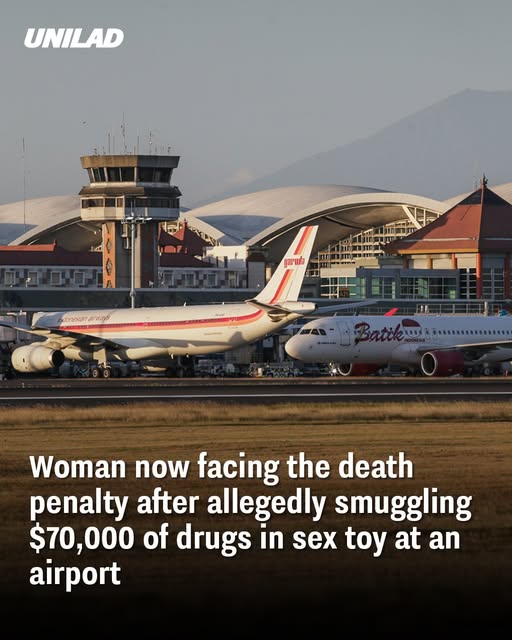A 42-year-old Peruvian woman, identified only by her initials N.S., was arrested upon arrival at Bali’s international airport on 12 August 2025, after traveling from Barcelona via Qatar. Customs agents became suspicious of her behavior, prompting a body search that uncovered concealed drugs rather than illicit items in her luggage.
Concealment and Confession
During the search, authorities discovered 1.4 kilograms (3.1 pounds) of cocaine hidden in several places: six packages wrapped in black duct tape inside a green bra, three similar packages inside her black underwear, and a sex toy inserted vaginally. In addition, 43 ecstasy pills were found concealed on her person.
N.S. told police she had been recruited online via the dark web in April by a man who offered her $19,000 (or up to $20,000 in some accounts) to bring the narcotics into Indonesia.

Legal Consequences and Indonesia’s Drug Laws
Indonesia is known for its harsh narcotics laws, and N.S. has now been charged under these stringent statutes. If convicted, she could face the death penalty, typically carried out by firing squad.
Precedents and Broader Context
This case echoes previous high-profile smuggling cases in Indonesia. Last month, three British nationals—Lisa Stocker, Jon Collyer, and Phineas Float—escaped the death penalty, receiving just 12 months in prison for smuggling nearly 1 kilogram of cocaine into Bali. Years earlier, cases like Mary Jane Veloso, who was saved from execution due to humanitarian intervention, underscored Indonesia’s balancing act between strict legal enforcement and international diplomatic pressure. Despite global criticism for its penal methods, Indonesia continues its aggressive anti-drug measures. A recent government crackdown between April and June 2025 saw 285 arrests—including several foreigners—and confiscated over half a ton of narcotics, highlighting both the scale of the issue and the country’s commitment to law-and-order responses
What Happens Next?
N.S.’s case will likely receive international attention. Facing a possible death sentence, her fate may hinge on legal representation, diplomatic involvement, and potential appeals. In other drug-related cases, such factors have at times resulted in sentence reductions or repatriation—though outcomes vary widely.
Global Attention and Human Rights Concerns
The case has begun attracting attention from international human rights organizations, many of which argue that Indonesia’s application of the death penalty for drug-related crimes is excessively harsh. Activists stress that while the country has a right to enforce its laws, the punishment should be proportionate to the crime, especially when questions remain about how the drugs were hidden and who may have orchestrated the smuggling attempt. Legal experts also note that cases involving foreigners often become politically charged. For Indonesia, maintaining a strict stance on drugs reinforces its “zero tolerance” reputation, but critics argue it risks turning individual offenders into symbols rather than addressing deeper issues within global trafficking networks. For the Peruvian woman, her future now depends on how Indonesian courts interpret both the evidence and the broader political climate. As her trial progresses, the world will be watching closely to see whether justice or strict deterrence prevails.

Conclusion
The case of the Peruvian woman arrested in Indonesia is more than just a courtroom drama—it reflects the clash between strict national laws, global trafficking concerns, and human rights debates. While Indonesian authorities emphasize deterrence through severe punishment, many argue that capital sentences do little to address the international networks driving the drug trade. For the accused, the stakes could not be higher, as her life now depends on a system known for its unforgiving approach. As her trial unfolds, the outcome will not only determine her fate but also reignite global conversations about justice, proportionality, and the limits of punishment in the fight against drugs.

















